Want to build your own online empire like Amazon or Etsy? You need a multi-vendor ecommerce website builder.
This isn’t some “nice-to-have” feature anymore.
It’s your ticket to massive scalability and higher profits without the headache of managing inventory or shipping.
Think about it: more vendors mean more products, more products mean more customers, and more customers mean more money in your pocket.
But choosing the right platform can feel like navigating a minefield. Don’t worry, I’ve got you covered.
In this article, I’m breaking down the 5 best multi-vendor ecommerce website builders to help you dominate the online marketplace game.
What is a Multi-Vendor Ecommerce Website Builder?

Before we look at the best multi-vendor e-commerce website builders, let’s get clear on what we’re talking about.
A multi-vendor ecommerce website builder is a platform that allows you to create an online marketplace where multiple sellers can list and sell their products.
You, as the marketplace owner, provide the platform and take a cut of each sale.
It’s like building your own digital mall.
You’re the landlord, collecting rent (commissions) while your vendors do the heavy lifting of selling.
Benefits of using a multi-vendor ecommerce website builder:
- Increased revenue: More vendors = more products = more sales = more money.
- Reduced overhead: No need to manage inventory or handle shipping.
- Wider product selection: Attract more customers with a diverse range of products.
- Scalability: Easily add new vendors and grow your marketplace.
- Automated processes: Streamline order management, payments, and more.
5 Best Multi-Vendor Ecommerce Website Builders
That said, let us look at some viable options.
1. Shopify
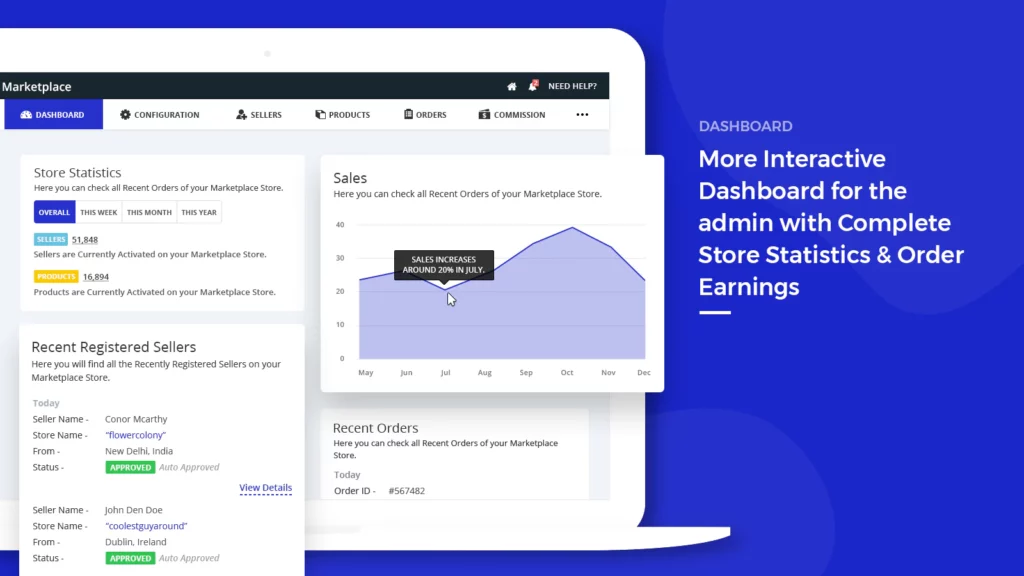
Shopify is the undisputed king of ecommerce, and its multi-vendor capabilities are no exception.
With the Shopify Multi-Vendor Marketplace App, you can transform your basic Shopify store into a bustling online marketplace.
Why Shopify?
- Ease of use: Shopify is known for its user-friendly interface, even for beginners.
- Massive app store: Extend your marketplace’s functionality with thousands of apps.
- Powerful marketing tools: Drive traffic and boost sales with built-in marketing features.
- Reliable support: Get help when you need it with 24/7 customer support.
Key Features:
- Vendor management: Easily manage vendor profiles, products, and payouts.
- Customizable storefronts: Give vendors control over their branding and product displays.
- Automated order fulfillment: Streamline order processing and shipping.
- Multiple payment gateways: Offer various payment options for a seamless checkout experience.
Who is it for?
Shopify is a great option for businesses of all sizes who want a reliable, scalable, and user-friendly platform.
Pricing:
Shopify offers various pricing plans, starting at $24/month. The Multi-Vendor Marketplace App typically has a separate monthly fee, starting from $15 per month.
2. Yo!Kart
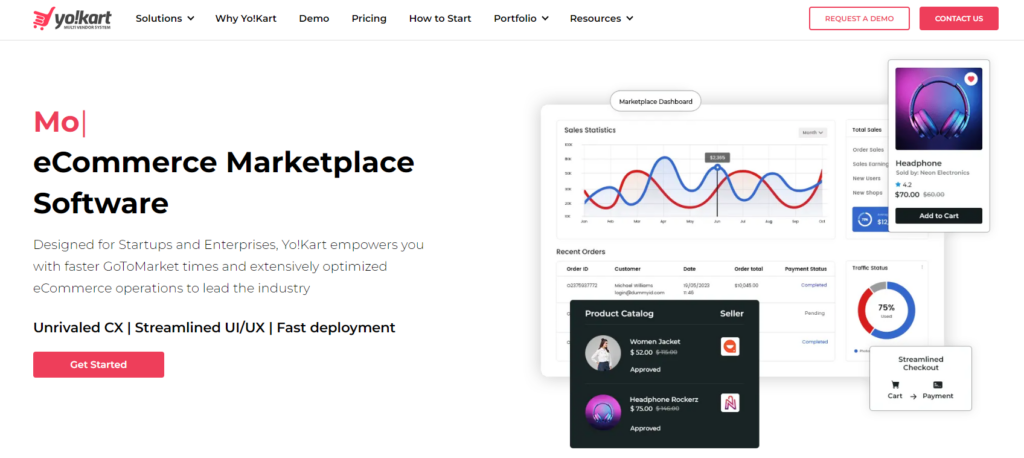
If you’re looking for complete control and customization, Yo!Kart is the way to go.
This self-hosted platform gives you the freedom to build a marketplace exactly the way you want it.
Why Yo!Kart?
- Highly customizable: Tailor every aspect of your marketplace to your specific needs.
- Feature-rich: Packed with built-in features for vendor management, product catalogs, and more.
- Mobile-first approach: Ensure a seamless experience for mobile shoppers.
- Scalable and secure: Built to handle high traffic and protect your data.
Key Features:
- Dedicated vendor dashboards: Empower vendors to manage their products, orders, and payouts.
- Advanced analytics: Track key metrics and gain insights into your marketplace’s performance.
- Multiple revenue models: Choose from commissions, subscriptions, or a combination of both.
- Multilingual and multicurrency support: Reach a global audience with ease.
Who is it for?
Yo!Kart is ideal for businesses with specific requirements and technical expertise who want full control over their marketplace.
Pricing:
Yo!Kart offers various packages, starting with a $499 one-time fee for their self-hosted platform.
3. CS-Cart Multi-Vendor
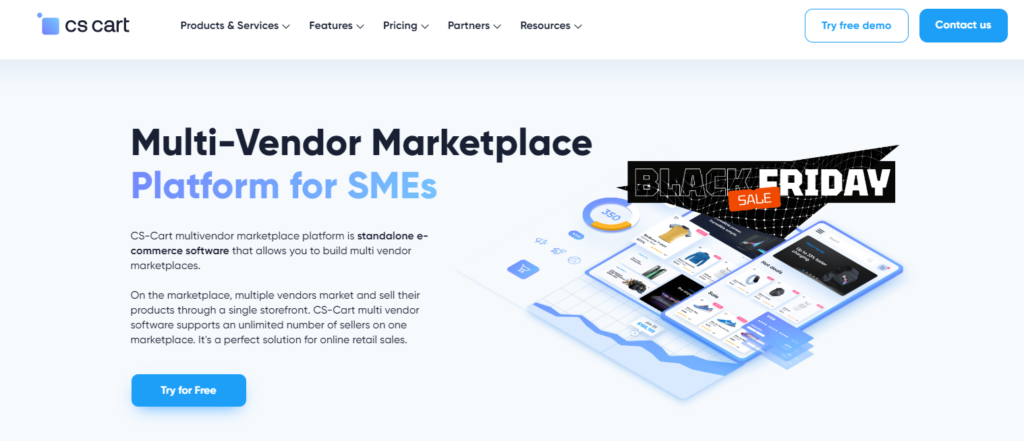
CS-Cart Multi-Vendor is another robust self-hosted platform that comes loaded with features to help you launch a successful online marketplace.
Why CS-Cart?
- Extensive functionality: Offers a wide range of features for vendor management, product catalogs, and order processing.
- Open-source code: Gives you complete control over customization and development.
- Strong community support: Benefit from a large and active community of users and developers.
- Scalable infrastructure: Handle high traffic volumes and complex operations with ease.
Key Features:
- Flexible commission system: Set different commission rates for different vendors or product categories.
- Advanced vendor payouts: Automate vendor payouts and manage finances efficiently.
- Built-in marketing tools: Promote your marketplace and attract new customers.
- Mobile-friendly design: Provide a seamless shopping experience across all devices.
Who is it for?
CS-Cart is a good choice for businesses with technical expertise who need a feature-rich and customizable platform.
Pricing:
CS-Cart Multi-Vendor offers two plans, on-premise, which has two plans, annual and one-time fee starting at $2,199.
The cloud version runs on a subscription plan, with monthly and annual options, $95 or $75 respectively per month.
4. Sharetribe
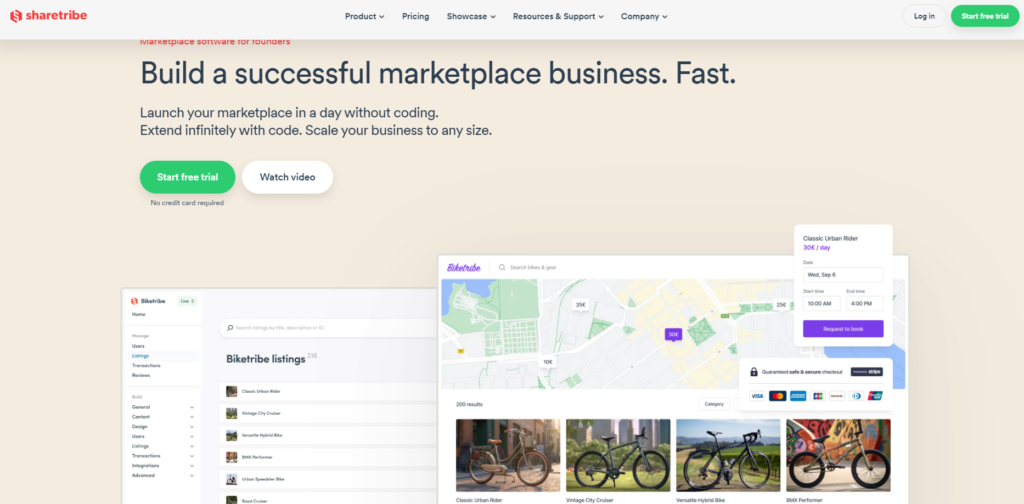
If you’re looking for a hassle-free Multi-vendor ecommerce website builder solution, Sharetribe is a great option.
This SaaS (Software as a Service) platform provides everything you need to launch a multi-vendor marketplace without any technical headaches.
Why Sharetribe?
- Easy setup: Get your marketplace up and running quickly with their intuitive platform.
- No coding required: Build and customize your marketplace without any technical skills.
- Affordable pricing: Choose from flexible subscription plans to fit your budget.
- Regular updates: Benefit from ongoing improvements and new features.
Key Features:
- Customizable design: Create a unique look and feel for your marketplace.
- Integrated payment processing: Accept payments securely and easily.
- Built-in communication tools: Facilitate communication between vendors and customers.
- Mobile-responsive design: Ensure a seamless experience for all users.
Who is it for?
Sharetribe is perfect for entrepreneurs and small businesses who want a simple and affordable solution to launch their marketplace.
Pricing:
Sharetribe offers various subscription plans, starting with a 14-day free trial plan for basic functionality.
After that, you can start paying from as low as $39 per month.
5. Dokan
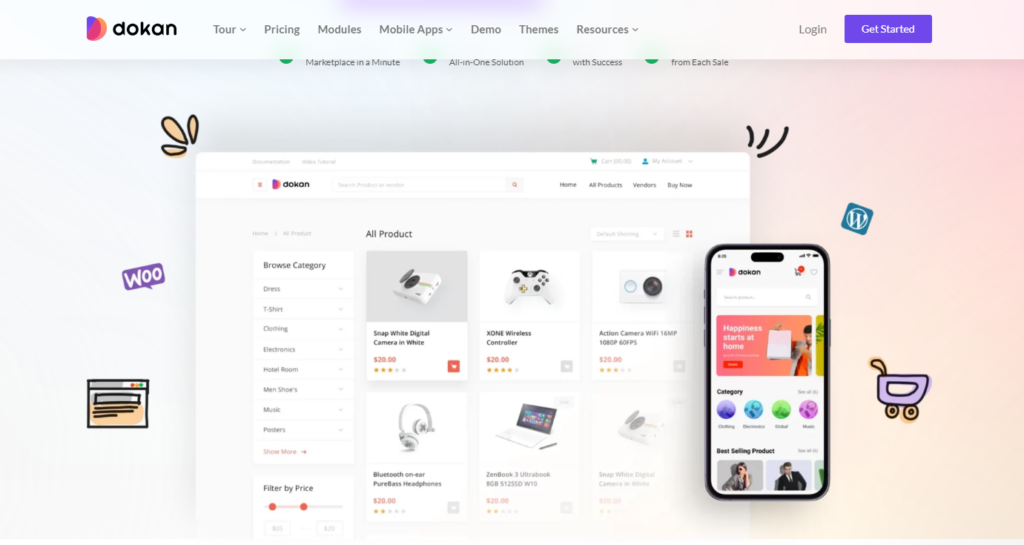
Already using WooCommerce for your online store?
Then you will love this Multi-vendor ecommerce website builder!
Dokan is a powerful plugin that transforms your WooCommerce site into a fully functional multi-vendor marketplace.
Why Dokan?
- Seamless integration: Works seamlessly with your existing WooCommerce setup.
- Extensive features: Provides all the essential features for managing vendors and products.
- Affordable pricing: Offers a range of pricing plans to suit different needs.
- Large community: Benefit from a large and active community of users and developers.
Key Features:
- Frontend vendor dashboards: Allow vendors to manage their products and orders from the frontend.
- Flexible commission system: Set different commission rates for different vendors or products.
- Withdrawal options: Provide vendors with various withdrawal methods.
- Vendor reviews and ratings: Build trust and transparency in your marketplace.
Who is it for?
Dokan is a great choice for businesses already using WooCommerce who want to expand their platform into a multi-vendor marketplace.
Pricing:
Dokan offers various pricing plans, starting with a free version for basic functionality.
The annual plan starts at $104 and lifetime from $484.
Choosing the Right Multi-Vendor Ecommerce Website Builder
| Feature | Shopify | Yo!Kart | CS-Cart Multi-Vendor | Sharetribe | Dokan |
| Pricing | Subscription (from $29/month + app fee) | One-time fee (various packages) | One-time license fee | Subscription (free plan available) | Subscription (free version available) |
| Hosting | Hosted | Self-hosted | Self-hosted | Hosted | Self-hosted (WooCommerce plugin) |
| Ease of Use | Beginner-friendly, drag-and-drop interface | Requires technical expertise | Requires technical expertise | Beginner-friendly, no coding required | Moderate technical skills required |
| Customization | Highly customizable with themes and apps | Highly customizable with open-source code | Highly customizable with open-source code | Customizable design templates | Customizable with WooCommerce themes and plugins |
| Features | Extensive app store, marketing tools, 24/7 support | Feature-rich, mobile-first, scalable | Extensive functionality, open-source code, strong community support | Customizable design, integrated payments, communication tools | Frontend vendor dashboards, flexible commissions, withdrawal options |
| Scalability | Highly scalable | Highly scalable | Highly scalable | Scalable | Scalable with WooCommerce |
| Ideal User | Businesses of all sizes seeking a reliable and user-friendly platform | Businesses with specific needs and technical expertise seeking full control | Businesses with technical expertise needing a feature-rich and customizable platform | Entrepreneurs and small businesses wanting a simple and affordable solution | Businesses already using WooCommerce wanting to expand into a multi-vendor marketplace |
Now that you know the top contenders, how do you choose the right one for your business?
Consider these factors:
- Your budget: Determine how much you’re willing to invest in your platform.
- Your technical skills: Choose a platform that matches your technical expertise.
- Your specific needs: Consider the features and functionality that are most important to you.
- Your long-term goals: Think about how you want your marketplace to grow and evolve.
Don’t be afraid to try out different platforms before making a decision.
Most offer free trials or demos so you can get a feel for their features and usability.
Dominate the Marketplace
Building a successful multi-vendor ecommerce website is no walk in the park.
But with the right platform and a solid strategy, you can create a thriving online marketplace that generates significant revenue and establishes your brand as a leader in your industry.
Remember, the key is to focus on providing value to both your vendors and your customers.
Create a user-friendly platform, offer a wide selection of quality products, and provide excellent customer service.
Read also:

